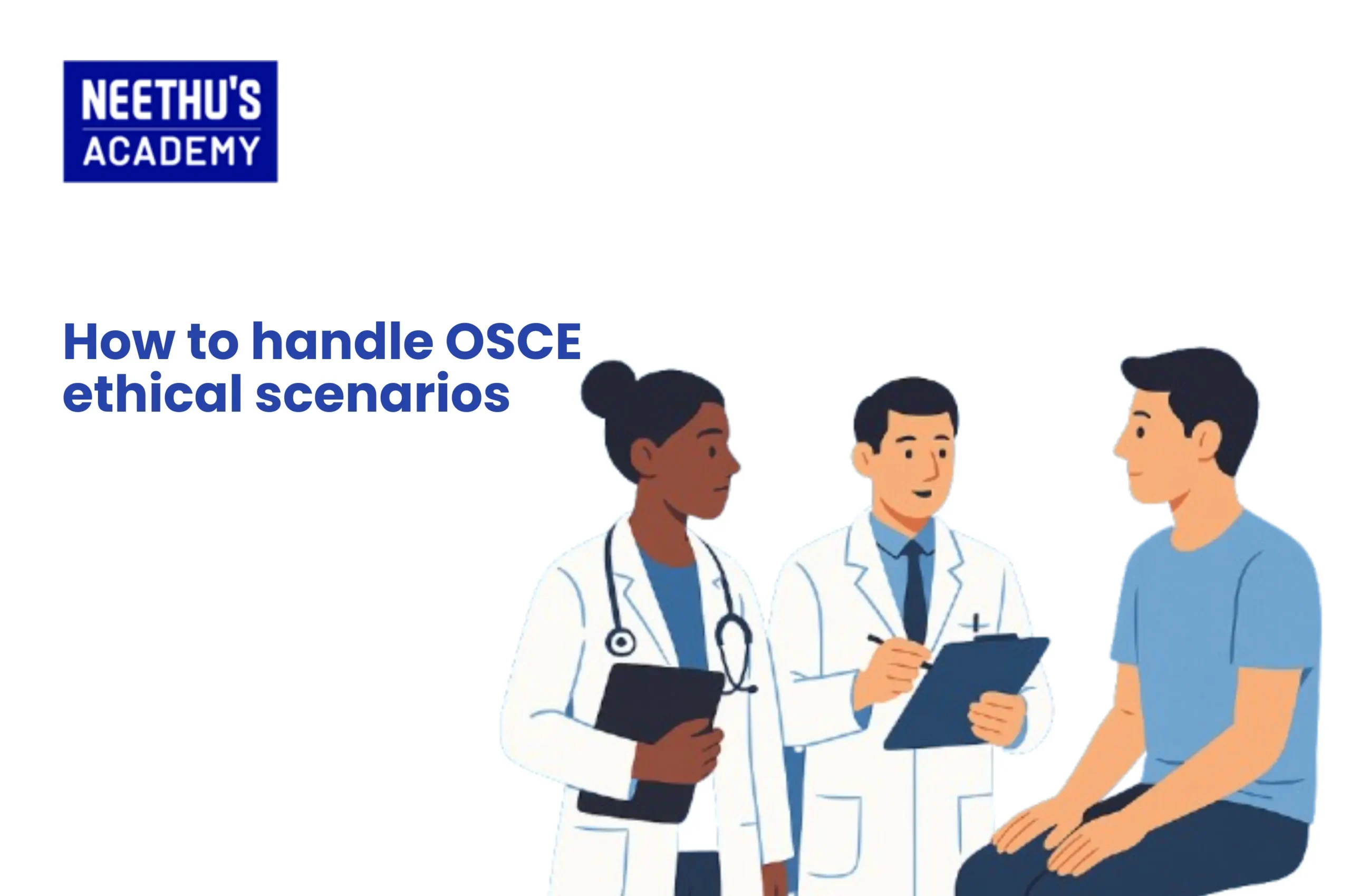OSCE is a critical assessment for healthcare professionals that tests not only the clinical knowledge but also the practical and communication skills…

How To Handle OSCE Ethical Scenarios
The Objective Structured Clinical Examination (OSCE) is a must-take obstacle for future nurses and healthcare workers, testing both clinical skills and ethical thinking. Among many, ethical situations in OSCE prove to be the most psychologically challenging. They require not just knowledge, but also empathy, communication, and a very good moral compass. In this blog, we will be talking about how to excel in OSCE nurse ethics, how to improve OSCE ethics, and how coaching can help you overcome these scenarios.
Understanding OSCE Ethical Scenarios
OSCE ethical situations place you in complex ethical situations of patient autonomy, consent, confidentiality, or professional boundaries. You may need to talk to an upset family member, resolve patient complaints, or deal with a violation of patient safety. These stations are not just about getting the “right” response but more about how effectively you can:
- Be empathetic
- Communicate clearly
- Adhere to ethical standards
- Remain professional in adversity
The objective is to challenge your OSCE ethical abilities in a realistic but controlled environment that reflects actual healthcare dilemmas.
Key Nursing Ethical Principles
To successfully tackle ethical issues in OSCEs, you should first be familiar with the major nursing ethics principles, which are:
- Autonomy: Honoring a patient’s right to informed decision-making.
- Beneficence: Doing good for the patient.
- Non-maleficence: Causing no harm.
- Justice: Treating patients without discrimination and equitably.
- Confidentiality: Protecting patient information.
- Accountability: Taking responsibility for actions and decisions.
Keeping these principles in mind during your OSCE ethical practice can help ground your responses in professional standards.
Strategies for Handling Ethical Scenarios
1. Stay Calm and Reflective
Keep your composure. Start by acknowledging the issue and gathering your thoughts. Speak slowly and clearly, ensuring your response is organized and empathetic.
2. Use the SPIES Framework
Many candidates use SPIES to structure their answers:
- Seek information
- Patient safety
- Initiative (what can you do?)
- Escalate (when necessary)
- Support (the patient and staff involved)
3. Show Empathy and Active Listening
Always acknowledge the patient’s concerns. Use statements such as “I understand this must be difficult” or “Thank you for bringing this to my attention.”
4. Stay Within Your Competency
Never commit to doing something you are not capable of. If an issue exceeds your level, it is alright to refer to a supervisor.
5. Adhere to Institutional Policies
Explain how you would refer to the nursing code of conduct or hospital policies. This demonstrates respect for ethical and legal principles.
Practicing these tips, you automatically enhance OSCE ethics and feel more assertive when at difficult stations.
Practice Makes Perfect: Sample Situations
Situation 1: Confidentiality Breach
A peer inadvertently discloses a patient’s diagnosis in public. What would you do?
Tip: Confirm the violation, reassure the patient (if around), and document the incident using proper channels and remain professional.
Situation 2: Refusal of Treatment
A mentally competent patient declines to undergo a lifesaving procedure.
Tip: Value the patient’s autonomy, but clarify they are thoroughly aware of the consequences and document everything.
Situation 3: Observing Negligence
You witness a senior member of staff disregarding a hygiene protocol.
Tip: Put patient safety first by reporting the incident after resolving it informally.
Regular OSCE ethical practice with such scenarios may assist in developing quick reflexes for dealing with actual exams.
Developing Ethical Skills with Coaching
One of the quickest methods of enhancing OSCE ethics is by taking courses at an OSCE coaching center. The centers offer structured coaching, practice exams, and feed-back by seasoned experts. Major advantages are:
- Role-playing exercises to mirror actual OSCE ethical situations.
- Customized OSCE ethics advice to polish your communication.
- Ongoing feed-back on your OSCE ethical practice.
- Material access to current case studies and recent exam patterns.
- One-on-one guidance to enhance confidence.
- Techniques to handle stress and time pressure in OSCEs.
Best OSCE Coaching Centre in Kerala
If you’re looking for expert guidance, Kerala offers some of the best OSCE coaching centres. One of the best options is Neethu’s Academy, known for its specialized OSCE training programs.
Why Choose Neethu’s Academy?
- A team of experienced mentors with healthcare backgrounds.
- Realistic ethical scenario simulations specific to nurses.
- Flexible online and offline coaching.
- Regular Mock exams and performance analysis.
- Successful track record of OSCE results.
- Budget-friendly packages for beginners and repeat test-takers.
Whether you’re beginning or seeking to refine your ethical answers, a well-organized course from a renowned OSCE coaching centre can give you the edge you require.
Conclusion
It’s not merely a question of what is right or wrong—it’s how you show compassion, judgment, and professionalism. Proper preparation, practical tips, and expert coaching from a premier OSCE coaching centre can help you confidently take your OSCE exam. Don’t forget, OSCE nurse ethics are as important as clinical skills, and perfecting them now will help you greatly in your career ahead.
Frequently Asked Questions
By using ethical principles, being communicative, and referring to policies or seniors when necessary.
Utilize online case scenarios, record yourself, and self-evaluate with standard rubrics.
By being professional, using ethical structures such as SPIES, and ensuring patient safety.
Prepare well in advance, practice daily, and handle time and stress management.
Related Blogs
- All Posts
- OSCE
Mastering communication skills is a must for better performance in the OSCE. Effective communication in OSCEs helps in rapport building with patients,…
The OSCE or the Objective Structured Clinical Examination is, in fact, one of the most important assessments for doctors and other healthcare…
Course Enquiry
Latest Posts
- All Posts
- canada
- CBT
- DELF
- DHA
- French
- GENERAL
- German
- Haad
- IELTS
- IQN NEW ZEALAND
- MOH
- NCLEX-RN
- NHRA
- OET
- OSCE
- Pearson Vue
- PROMETRIC
- PTE
- TOEFL
- Back
- NCLEX - NGN
- Back
- OET FOR PHYSIOTHERAPIST
- OET FOR PHARMACIST
- OET FOR DOCTORS



